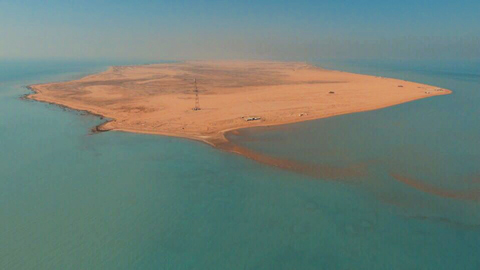The Kuwaiti island of Failaka is depicted by those who have lived on it as a precious pearl in the middle of the Gulf. The greenery of the island is pleasing to the eye due to the abundance of freshwater springs. Unlike the Kuwaiti mainland, which is a mere 20 km away from its coasts, Failaka was characterized by self-sufficiency in agricultural crops and drinking water, while these were brought to the rest of the country from neighboring countries three centuries ago.
Failaka is located in the northwestern corner of the Arabian Gulf. The history of Kuwaiti families living on the island dates back to the 18th century, but they abandoned it during the Iraqi invasion in August 1990. This was not the case 4,000 years ago, because it is the only area in Kuwait that has been continuously inhabited since the Kashi civilization that settled in Bahrain and Failaka and contacted the Dilmun civilization.
From the start of excavations on Dec 31, 1957 to the writing of this article, traces of Sumerian, Greek, Sassanian, Christian and Late Islamic periods have been discovered in the modern and postmodern period of Kuwait, ending with the remnants of the Iraqi invasion. "These historical evidences prove the importance of the island to the rest of the world. It explains the movements of human beings who lived there and their civilizations," said Dr Hasan Ashkanani told Kuwait Times.
Dr Hasan is a professor of archaeology and anthropology at the Faculty of Social Science at Kuwait University. He is specialized in the artifacts of Kuwait and Failaka. He described the island as the true treasure of Kuwaitis and researchers around the globe. "It is uncommon to find an archeological site in a country that has layers of historical eras every few centimeters you dig vertically. It's loaded with artifacts. The government, represented by the National Council of Culture, Arts and Letters, has realized the historical value of the island and is fully responsible for the expenses of all the international missions visiting Kuwait annually, as well as publishing their findings in scientific journals. Four to eight researches get published annually about the excavations on Failaka," he explained.
An Amiri decree of 1960 and the antiquities law of Kuwait entrust the NCCAL with the upkeep of the antiquities. The council is solely responsible for assessing the archaeological and historical properties of the objects, sites and buildings and the importance of every artifact, along with the reports of the artifacts to be recorded, maintained, studied and utilized. It is also entitled to the acquisition of historical sites with the approval of the Cabinet.
"Despite the awareness of the government of the high value of Kuwait's heritage, some investors don't seem to care enough to not take on projects that destroy our history. It is not difficult to project an alternative model of investment schemes in construction, and we are always ready to help. However, they won't accept other proposals," alleged Dr Ashkanani.
Kuwait signed the 1972 UNESCO Convention on the Protection of World and Natural Heritage, which requires signatories to protect their local heritage and not deliberately harm it. The NCCAL established the UNESCO Unit for Engineering Affairs, which is familiar with all the articles of the convention and is there to offer advice to those who submit their project proposals. UNESCO also protects sites that stand as a memory among peoples, even if they are free of antiquities.
Kuwait is a signatory to this agreement, so investors should share any investment project data with UNESCO. "The organization can provide strategic plans for construction. To raise the historical value of archaeological sites, both in Failaka or anywhere in the world, we should not distort the structure of the site and the surrounding landscape, and in order to get international recognition, we need to follow many strict requirements set by UNESCO. There are successful examples of such projects in many European cities that have not been hindered by anything to preserve their cultural heritage during their development. Kuwait is unfortunately late, but we are in a good position," Dr Ashkanani said.
The pace of exploration has increased since 2003, with five to nine missions from countries such as Italy, France, Denmark, Britain, the Netherlands and others. There are now more than 88 excavation sites on the island, which necessitates the need for the compatibility of tourism development of the island with the protection of archaeological areas. The history of the island is not for the people of Kuwait alone. Failaka is a historical link to many of the surrounding world civilizations that was formerly lost with time.
By Athoob Al-Shuaibi











